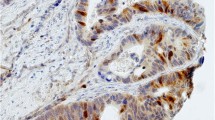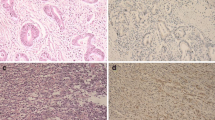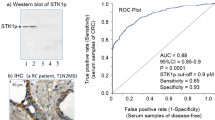Abstract
Background
Thymidylate synthase (TS) is regarded as a parameter of 5-fluorouracil (5-FU) chemosensitivity for colorectal carcinoma. Recent researchers indicate that the chemosensitivity of 5-FU for colorectal carcinoma with low expression of TS is better than tumors with high expression of TS. But the relation between TS expression and overall survival of curatively resected colorectal cancer patients has been less studied.
Methods
Specimens of curatively resected colon carcinoma from 148 patients were included in this study. TS expression in the tumor was assessed by immunohistochemical staining technique, and the patients were categorized into TS-(+) and TS-(−) groups. First, the relation between TS expression and survival of patients was examined. Next, for each group, we compared survival between the chemotherapy-(+) and the chemotherapy-(−) subgroup.
Results
Overall survival was significantly better in the TS-(−) group (n=107) than in the TS-(+) group (n=41) (P=.0003). In the TS-(−) group, there was little difference between the chemotherapy-(+) and the chemotherapy-(−) subgroup. In the TS-(+) group, the survival of the chemotherapy-(+) subgroup was significantly better than the chemotherapy-(−) subgroup (P=.0439).
Conclusions
TS, itself, may be a prognostic factor for colon carcinoma; and 5-FU adjuvant chemotherapy may be appropriate for colon carcinoma with high expression of TS.
Similar content being viewed by others
References
Johnston PG, Lenz HJ, Leichman CG, et al. Thymidylate synthase gene and protein expression correlate and are associated with response to 5-fluorouracil in human colorectal and gastric tumors.Cancer Res 1995;55:1407–12.
Isacoff WH, Borud K. Chemotherapy for the treatment of patients with metastatic colorectal cancer: an overview.World J Surg 1997;21:748–62.
Drake JC, Voeller DM, Allegra CJ, Johnston PG. The effect of dose and interval between 5-fluorouracil and leucovorin on the formation of thymidylate synthase ternary complex in human cancer cells.Br J Cancer 1995;71:1145–50.
Clark JL, Berger SH, Mittelman A, Berger FG. Thymidylate synthase gene amplification in a colon tumor resistant to fluoropyrimidine chemotherapy.Cancer Treat Rep 1987;71:261–5.
Peters GJ, van der Wilt CL, van Triest B, Pisanelli GC. Thymidylate synthase and drug resistance.Eur J Cancer 1995;31A:1299–305.
Peters GJ, van der Wilt CL, van Groeningen CJ, Smid K, Meijer S, Pinedo HM. Thymidylate synthase inhibition after administration of fluorouracil with or without leucovorin in colon cancer patients: implications for treatment with fluorouracil.J. Clin Oncol 1994;12:2035–42.
Leichman CG, Lenz HJ, Leichman L, et al. Quantitation of intratumoral thymidylate synthase expression predicts for disseminated colorectal cancer response and resistance to protracted-infusion fluorouracil and weekly leucovorin.J Clin Oncol 1997;15:3223–9.
Rustum YM, Harstrick A, Cao S, et al. Thymidylate synthase inhibitors in cancer therapy: direct and indirect inhibitors.J Clin Oncol 1997;15:389–400.
Kase S, Kubota T, Watanabe M, et al. The modulation byl-leucovorin of 5-fluorouracil antitumor activity on human colon carcinoma cells in vitro and in vivo.Surg Today 1993;23:615–20.
Van der Wilt CL, Braakhuis BJ, Pinedo HM, De Jong M, Smid K, Peters GJ. Addition of leucovorin in modulation of 5-fluorouracil with methotrexate: potentiating or reversing effect?Int J Cancer 1995;61:672–8.
Pizzorno G, Sun Z, Handschumacher RE. Aberrant cell cycle inhibition pattern in human colon carcinoma cell lines after exposure to 5-fluorouracil.Biochem Pharmacol 1995;49:553–7.
Johnston PG, Fisher ET, Rockette HE, et al. The role of thymidylate synthase expression in prognosis and outcome of adjuvant chemotherapy in patients with rectal cancer.J Clin Oncol 1994; 12:2640–7.
Yeh KH, Shun CT, Chen CL, et al. High expression of thymidylate synthase is associated with the drug resistance of gastric carcinoma to high dose 5-fluorouracil-based systemic chemotherapy.Cancer 1998;82:1626–31.
Mirjolet JF, Barberi Heyob M, et al. Thymidylate synthase expression and activity: relation to S-phase parameters and 5-fluorouracil sensitivity.Br J Cancer 1998;78:62–8.
Leichman L, Lenz HJ, Leichman CG, et al. Quantitation of intratumoral thymidylate synthase expression predicts for resistance to protracted infusion of 5-fluorouracil and weekly leucovorin in disseminated colorectal cancers: preliminary report from an ongoing trial.Eur J Cancer 1995;31A:1306–10.
Kornmann M, Link KH, Lenz HJ, et al. Thymidylate synthase is a predictor for response and resistance in hepatic artery infusion chemotherapy.Cancer Lett 1997;118:29–35.
Spears CP, Gustavsson BG, Berne M, Frosing R, Bernstein L, Hayes AA. Mechanisms of innate resistance to thymidylate synthase inhibition after 5-fluorouracil.Cancer Res 1988;48:5894–900.
Spears CP, Shahinian AH, Moran RG, Heidelberger C, Corbett TH. In vivo kinetics of thymidylate synthase inhibition in 5-fluorouracil-sensitive and-resistant murine colon adenocarcinomas.Cancer Res 1982;42:450–6.
Lenz HJ, Danenberg KD, Leichman CG, et al. p53 and thymidylate synthase expression in untreated stage II colon cancer: associations with recurrence, survival, and site.Clin Cancer Res 1998;4:1227–34.
Pestalozzi BC, McGinn CJ, Kinsella TJ, et al Increased thymidylate synthase protein levels are principally associated with proliferation but not cell cycle phase in asynchronous human cancer cells.Br J Cancer 1995;71:1151–7.
Yamachika T, Nakanishi H, Inada K, et al. A new prognostic factor for colorectal carcinoma, thymidylate synthase, and its therapeutic significance.Cancer 1998;82:70–7.
Sinicrope FA, Ruan SB, Cleary KR, Stephens LC, Lee JJ, Levin B. bcl-2 and p53 oncoprotein expression during colorectal tumorigenesis.Cancer Res 1995;55:237–41.
Etienne MC, Lagrange JL, Dassonville O, et al. Population study of dihydropyrimidine dehydrogenase in cancer patients.J Clin Oncol 1994;12:2248–53.
Beck A, Etienne MC, Cheadame S, et al. A role for dihydropyrimidine dehydrogenase and thymidylate synthase in tumour sensitivity to fluorouracil.Eur J Cancer 1994;30A:1517–22.
Etienne MC, Cheadame S, Fischel JL, et al. Response to fluorouracil therapy in cancer patients: the role of tumoral dihydropyrimidine dehydrogenase activity.J Clin Oncol 1995;13:1663–70.
Katona C, Kralovánszky J, Rosta A, et al. Putative role of dihydropyrimidine dehydrogenase in the toxic side effect of 5-fluorouracil in colorectal cancer patients.Oncology 1998;55:468–74.
McLeod HL, Sludden J, Murray GI, et al Characterization of dihydropyrimidine dehydrogenase in human colorectal tumours.Br J Cancer 1998;77:461–5.
McMurrough J, McLeod HL. Analysis of the dihydropyrimidine dehydrogenase polymorphism in a British population.Br J Clin Pharmacol 1996;41:425–7.
Lu Z, Zhang R, Carpenter JT, Diasio RB. Decreased dihydropyrimidine dehydrogenase activity in a population of patients with breast cancer: implication for 5-fluorouracil-based chemotherapy.Clin Cancer Res 1998;4:325–9.
Ridge SA, Sludden J, Wei X, et al. Dihydropyrimidine dehydrogenase pharmacogenetics in patients with colorectal cancer.Br J Cancer 1998;77:497–500.
Author information
Authors and Affiliations
Corresponding author
Rights and permissions
About this article
Cite this article
Takenoue, T., Nagawa, H., Matsuda, K. et al. Relation between thymidylate synthase expression and survival in colon carcinoma, and determination of appropriate application of 5-fluorouracil by immunohistochemical method. Annals of Surgical Oncology 7, 193–198 (2000). https://doi.org/10.1007/BF02523653
Received:
Accepted:
Issue Date:
DOI: https://doi.org/10.1007/BF02523653




